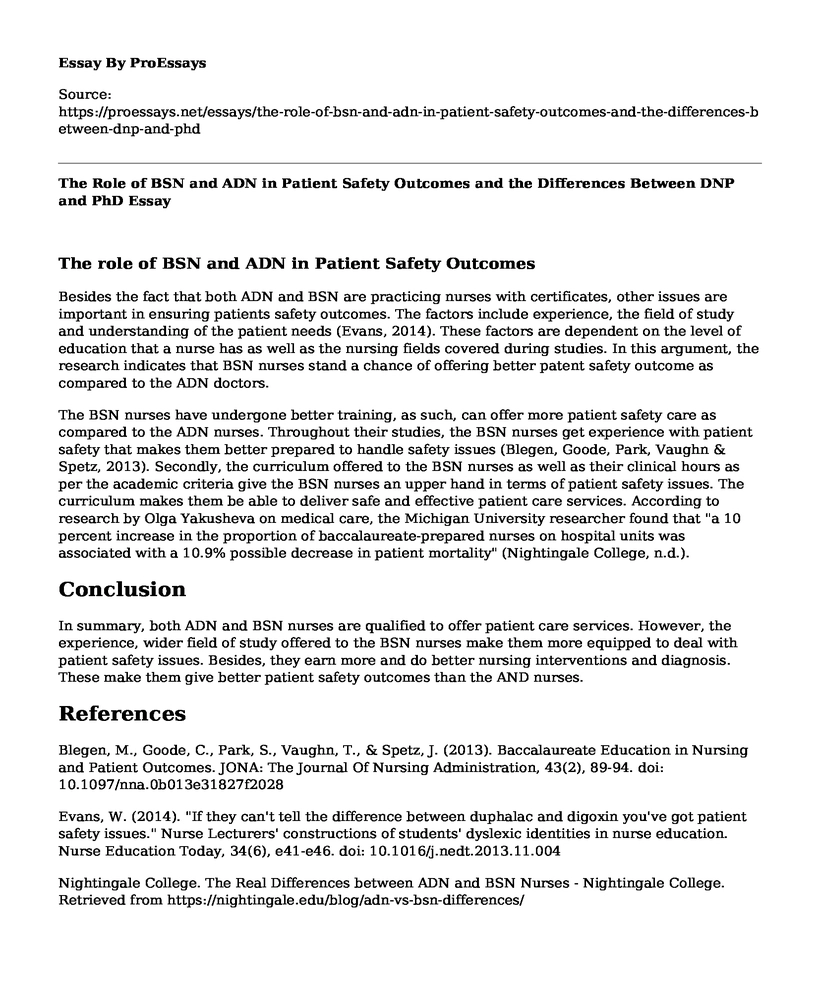The role of BSN and ADN in Patient Safety Outcomes
Besides the fact that both ADN and BSN are practicing nurses with certificates, other issues are important in ensuring patients safety outcomes. The factors include experience, the field of study and understanding of the patient needs (Evans, 2014). These factors are dependent on the level of education that a nurse has as well as the nursing fields covered during studies. In this argument, the research indicates that BSN nurses stand a chance of offering better patent safety outcome as compared to the ADN doctors.
The BSN nurses have undergone better training, as such, can offer more patient safety care as compared to the ADN nurses. Throughout their studies, the BSN nurses get experience with patient safety that makes them better prepared to handle safety issues (Blegen, Goode, Park, Vaughn & Spetz, 2013). Secondly, the curriculum offered to the BSN nurses as well as their clinical hours as per the academic criteria give the BSN nurses an upper hand in terms of patient safety issues. The curriculum makes them be able to deliver safe and effective patient care services. According to research by Olga Yakusheva on medical care, the Michigan University researcher found that "a 10 percent increase in the proportion of baccalaureate-prepared nurses on hospital units was associated with a 10.9% possible decrease in patient mortality" (Nightingale College, n.d.).
Conclusion
In summary, both ADN and BSN nurses are qualified to offer patient care services. However, the experience, wider field of study offered to the BSN nurses make them more equipped to deal with patient safety issues. Besides, they earn more and do better nursing interventions and diagnosis. These make them give better patient safety outcomes than the AND nurses.
References
Blegen, M., Goode, C., Park, S., Vaughn, T., & Spetz, J. (2013). Baccalaureate Education in Nursing and Patient Outcomes. JONA: The Journal Of Nursing Administration, 43(2), 89-94. doi: 10.1097/nna.0b013e31827f2028
Evans, W. (2014). "If they can't tell the difference between duphalac and digoxin you've got patient safety issues." Nurse Lecturers' constructions of students' dyslexic identities in nurse education. Nurse Education Today, 34(6), e41-e46. doi: 10.1016/j.nedt.2013.11.004
Nightingale College. The Real Differences between ADN and BSN Nurses - Nightingale College. Retrieved from https://nightingale.edu/blog/adn-vs-bsn-differences/
The Differences between DNP and PhD
For people pursuing advanced nursing degrees to allow them to become nurse practitioners, the terms DNP (doctor of nursing practice) and Ph.D. (doctor of philosophy) become important in what they chose to study. Both Ph.D. and DNP are research-focused fields in the nursing career. However, they have differences that would make a person choose one over the other (Bednash, Breslin, Kirschling & Rosseter, 2014). For instance, I would choose DNP over Ph.D. for various reasons.
Despite the fact that both Ph.D. and DNP are terminal nursing degrees, I choose DNP because it incorporates NP specialization. Once a person does DNP successfully, there will not be any need of pursuing a postgraduate certificate in order to become an NP. On the other hand, a person who does Ph.D. will not become an NP unless he or she pursues a postgraduate certificate. Incorporation of NP in DNP makes it possible for me to complete my studies at one go thence becoming a nurse without spending more money in pursuing another course in nursing (DeNisco & Barker, 2013).
Another reason I choose DNP over Ph.D. is that its completion requires that the student undertake a clinical project that is important in understanding evidence-based practices in the nursing career. I think the clinical project offers a better understanding of the requirements of a nurse as opposed to the research pursued under the Ph.D. program. In the Ph.D. program, one focuses on an original report that helps in the understanding the methodology used in research as well as analyzing research results (Melnyk, 2013). It also requires that one defend his or her dissertation. Such knowledge may not help me as much as the clinical research to help me be a good nurse.
References
Bednash, G., Breslin, E., Kirschling, J., & Rosseter, R. (2014). Ph.D. or DNP. Nursing Science Quarterly, 27(4), 296-301. doi: 10.1177/0894318414546415
DeNisco, S., & Barker, A. (2013). Advanced practice nursing. Burlington, Mass.: Jones & Bartlett Learning.
Melnyk, B. (2013). Distinguishing the Preparation and Roles of Doctor of Philosophy and Doctor of Nursing Practice Graduates: National Implications for Academic Curricula and Health Care Systems. Journal of Nursing Education, 52(8), 442-448. doi: 10.3928/01484834-20130719-01
Cite this page
The Role of BSN and ADN in Patient Safety Outcomes and the Differences Between DNP and PhD. (2022, Jul 18). Retrieved from https://proessays.net/essays/the-role-of-bsn-and-adn-in-patient-safety-outcomes-and-the-differences-between-dnp-and-phd
If you are the original author of this essay and no longer wish to have it published on the ProEssays website, please click below to request its removal:
- Is Billy Pilgrim Sane or Insane? - Paper Example
- Paper Example on Standing Desks: The Way to Reduce Diabetes Cases in Schools
- Collaboration and Leadership for Effective Emergency Management - Article Analysis Essay
- Effective Communication in Nursing Essay Example
- Essay Example on Teenage Moms: The Socio-Economic Impact of Teen Pregnancy
- Paper Example on EAP vs Gen. English: In-Depth Analysis, Skills, Areas of Improvement & Conclusion
- Essay Example on Optimizing Shift Exchange for Nurses: SIPOC Method







